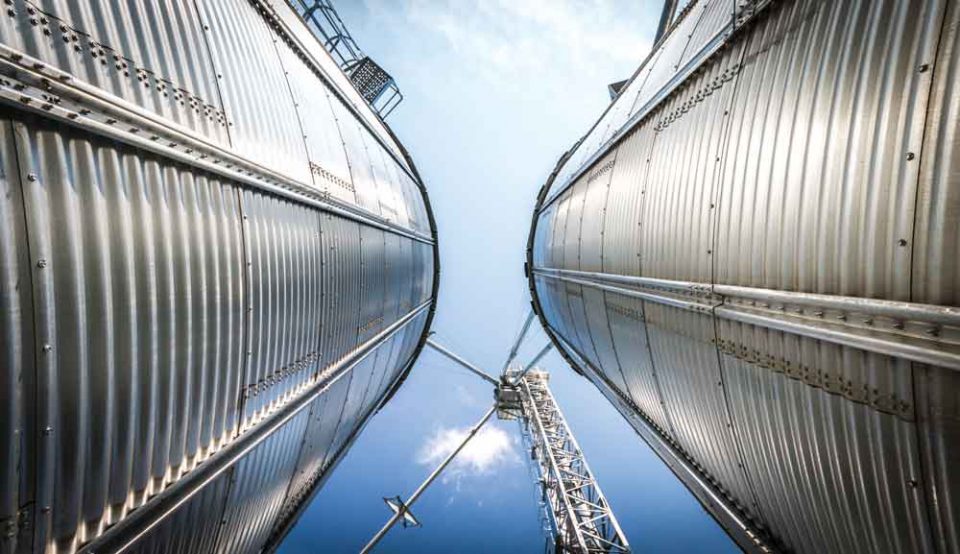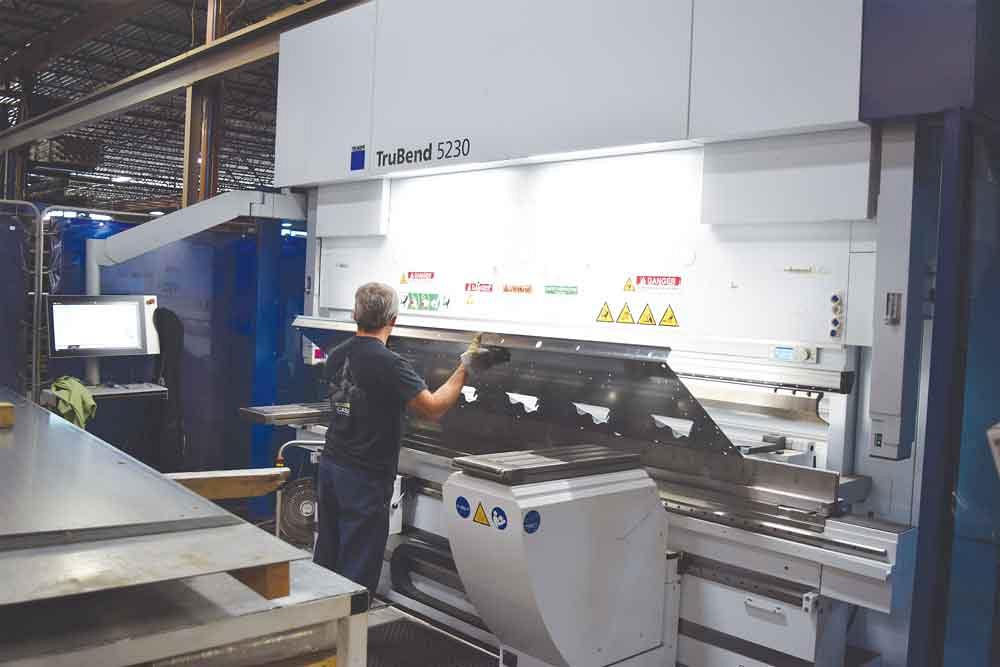Over the better part of a decade, Canada metal fabricator Comptoir Agricole Ste-Anne (CASA) has increased the benefits it can offer customers directly from its fab shop and design department by developing a fully integrated service provider for the agricultural industry. Photos provided by Comptoir Agricole Ste-Anne (CASA)
One of the best ways to expand your business is by increasing your value to existing customers. That’s wisdom that Canada metal fabricator Comptoir Agricole Ste-Anne (CASA) has taken to heart over the past seven years as it has gradually increased the benefits it can offer customers directly from its fabrication shop and design department, creating a fully integrated service provider for the agricultural industry.
Repentigny, Que.-based CASA specializes in the fabrication, sale, and installation of agricultural equipment used to handle grain. But the fabrication and design parts of the business are comparatively recent additions to its skill set. The founder, Serge Racine, focused on the distribution and installation of equipment purchased from Grain System Inc. (a worldwide silo supplier) and other companies. Serge’s son Mathieu Racine brought to the company a focus on value-added services.
The younger Racine has worked at the company since he was 17, getting the opportunity to experience all aspects of the business, learning the secret to its success from the ground up. His father, always keen to treat his customers well, built strong relationships throughout eastern Canada. Mathieu, however, knew that the company now had the strength and the reach to do more. He has focused on hiring designers and building up production capabilities to build and sell CASA-branded and -made innovative products.
“Our mission is to help grain producers get the most of their harvest by supplying them with quality systems and equipment. We help customers with the design of their grain handling systems, assessing their needs, manufacturing the product, and managing the installation,” said Elie Tochan, CASA’s CFO. “We want to be able to respond to customer needs quickly, delivering parts and services to them within days rather than weeks when necessary, and being able to ensure that when we install their grain handling system, we can see it up and running before we leave their facility.”
Fab Shop Precision
CASA has gradually expanded its fabrication shop since 2013. In that year it purchased a punch press and a press brake from TRUMPF. Suddenly the company had the ability to produce some parts for its grain handling installations.
Although the company had welders on-site, it increased production speed by adding a welding robot to its shop floor in 2016, and then a second in 2018. Last year the company added a second press brake and a stamping press.
Production, however, is about more than machines. It’s all about the interaction between man and machine, the flow of products made more or less efficient by the systems a company puts in place related to both human resources and technology.
In terms of technology, CASA introduced manufacturing management software that allows managers to track production on the shop floor in real time.
“We understand how long each product should take in production at each station,” said Tochan. “If one department or process slows down, we have someone who monitors that and goes down to the shop floor to discuss it with the people involved. It may be that a product has been altered and the production estimates are off. It may be that a tool needed for the job is missing from that station. It may be that someone is not well, or there is a new person that requires more training. Regardless of the reason, we react to it rapidly rather than allowing a day to go by with no action. This way, we can ensure that shipments are not delayed while also looking out for the needs of our employees.”
CASA has adopted this technology because it wants to be a leading practitioner of Industry 4.0 processes. The company is now installing a new TRUMPF fiber laser cutting table alongside a STOPA material handling system, which will allow it to automate cutting processes and expand into the manufacture of more innovative products. But before making that investment, management wanted to ensure that its current processes were as efficient as possible. To do so, they engaged a consultant from TRUMPF in Germany. The consultant spent a week doing time and motion studies on the production floor. The purpose was to ensure that CASA hadn’t caught any gaps in its step-by-step Industry 4.0 development.
Here we see a flat-bottom conveyor on a catwalk under construction on the CASA shop floor. Photos provided by Comptoir Agricole Ste-Anne (CASA)
CASA was pleased with the results of the study.
“The only problem the consultant observed was that materials were not being transported to the press brake operator in an efficient manner,” said Tochan. “Instead of the material coming to the operator, the operator had to collect it from elsewhere. This is a poor use of the time of a skilled employee, so we have arranged it so that another employee has the task of transporting those materials to him.”
In another shop, the consultant may have advised investing in a new machine or software to boost productivity, but CASA has already mapped out much of its plan for the next few years.
Production improvement ideas, however, may come from anywhere in the organization. “Communication is the key to our success,” said Tochan. “We encourage employees to share in the company’s strategy, so we created the concept of an employee committee called CASAWAY. It is comprised of representatives from our office employees, shop employees, construction site workers, and seasonal workers. The main goal of the committee is to improve employees’ working methods, engaging staff in refining the products and services we offer.”
Design Know-how
Grain handling system needs can be as simple as a single silo that can be delivered within a week to a client who can, if they wish, assemble it themselves. Other systems, however, can take as long as three months just for installation, and around six months from design to delivery. The faster all this work can be completed, the better it is for the customer, of course. CASA’s fabrication shop is an important part of speeding delivery, but the company has also developed an engineering department that is working to develop other products that can help speed up and enhance customer installations. This new division has turned CASA into an integrated service company for its clients, the innovative company Mathieu Racine knew it could become.
One such innovation that CASA has brought to market is a control panel for its grain handling systems.
“This has really impressed our clients because it is our own product, developed in-house,” said Tochan. “Because it’s not coming from another supplier, they know that not only can we install it, but we can also provide service for it promptly. Before, we used to buy the control panel and install it but we couldn’t connect it for the client, so we would leave the job site without being assured that their system would run smoothly. Now we can be confident that our customers’ needs are being met, from the fabricated parts we make to the control panel. The investment in a fiber laser and material handling system will enhance our abilities in delivering customer needs.”
And customers are able to monitor their production remotely, thanks to the software investments CASA has made.
“Through their smartphones, customers can review exactly where in the production process their projects stand,” said Tochan. “We want to be completely transparent with our customers. It gives them confidence in what we do and builds our relationship in a positive way. We want to be a partner in their success, not just another supplier.”
Careful Expansion
With this full package of design, fabrication, and installation skills, CASA is preparing for expansion across Canada and the U.S. As a company with a young management team and a thirst for new challenges, the future looks bright. This has been recognized outside the company already; CASA was named one of Canada’s 50 Best Managed Companies last year, and it has been named an innovation leader by Quebec’s Ministry of the Economy. Time will tell, but the management team takes a measured approach to each investment, each step on its journey.
“We’ve ensured that every investment so far has a return on investment below two years,” said Tochan. “We want to see steady growth of our integrated approach to the business—something that is unique in Quebec. Grain producers are very sensitive to price, which drives each of these investment decisions. Everything we can build reduces marginal costs for our customers and strengthens our market hold.”



